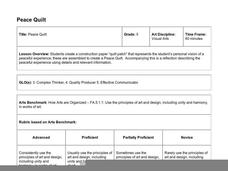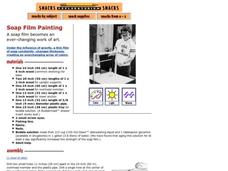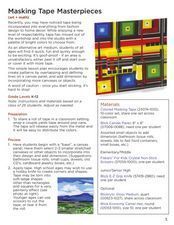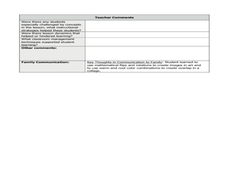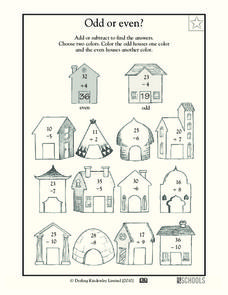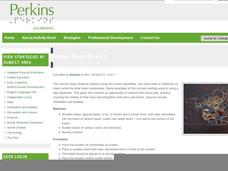Curated OER
Do You Want to Be My Friend?
Learners participate in a variety of emergent and early-literacy activities based on a "friendship" theme. Learners listen to the book Do You Want to Be My Friend by Eric Carle, then echo read, choral read, and independently read...
Curated OER
Terrific Tessellations
Young scholars create to pieces of artwork using two primary colors and tessellation techniques. This is an excellent lesson that can be accomplished using standard art techniques or educational software such as Adobe Photoshop or...
Curated OER
Napping House
Read The Napping House and describe the visual characteristics of the illustrations. In this perspective lesson, learners identify color elements. They recognize that the text is repetitive and find patterns in the...
Curated OER
Make a Van Gogh-Style Self-Portrait
Learn by doing! Young artists try their hand at creating their own self-portraits in the style of Vincent van Gogh. This worksheet contains a brief explanation of the essential qualities of van Gogh's art: complementary colors and...
Curated OER
The Art and Science of Impressionist Color
Discover Impressionist painting as students investigate the 19th century combinations of colors characteristically used. Students experiment with their own paintings, utilizing primary and secondary colors.
Olomana School
Mixtures and Solutions: Paper Chromatography Experiment
Why does some ink bleed through paper, and other ink doesn't? Practice some paper chromatography to separate the colors from a pen with an interactive experiment for middle and high schoolers. Learners use a variety of solutions to track...
Dick Blick Art Materials
“Rhythm in Layers”
Young artists learn to build rhythm into a design by repeating colors, shapes, and patterns in a 3-D sculpture activity.
Curated OER
Ratiocination
Writers use the four steps outlined here to edit their own or a peer’s paper. Using different colors of highlighters, editors note “to be” verbs, examine the length of sentences, box the first word in every sentence, and mark instances...
Hawaiʻi State Department of Education
Peace Quilt
Learners explore color, shape, line, balance, radial symmetry, unity, repetition, and pattern as they make a peace quilt inspired by those made by Hawaiian women in the 1800s. After learning a bit about the history or peace quilts, the...
Exploratorium
Soap Film Painting
If you are up for constructing a wooden frame, you can do this demonstration of the interference patterns when light reflects off of layers of soapy film. Both constructive and destructive interference can be seen as evidenced by the...
Teach Engineering
Bubbles and Biosensors
Bubbles aren't just for children. In the third installment of a seven-part series, teenagers use bubble solution to create bubbles and observe patterns of refraction on the bubble surfaces. Application of this concept to thin films in...
Curated OER
Masking Tape Masterpieces
Students create non-objective art based on the design elements of line, color, balance and movement using tape. This simple lesson plan encourages students to create patterns by overlapping and defining lines on a canvas panel. One of...
Curated OER
Geometric Collages
Fourth graders investigate the concept of geometric patterning. They create their own patterns with a few basic requirements. The patterns must illustrate the concepts of flipping, 90 and 180 degree rotations. The collages also consist...
Curated OER
Quilt Block Collage
Learn the art of quilting with this lesson plan that can be connected to a history lesson on quilts in Ancient Egypt, China, and modern art. After studying a general history of quilts, its uses, and the history of different patterns,...
Berkshire Museum
Camouflage!: Collecting Data and Concealing Color
Help young scholars see the important role camouflage plays in the survival of animals with a fun science lesson. Starting with an outdoor activity, children take on the role of hungry birds as they search for worms represented by...
Teach Engineering
What Does Light See?
The second installment of a seven-part series focuses on the refraction of light and how it affects the colors we see. Learners consider how this concept connects to biosensors for cancer detection.
Curated OER
Odd or Even?
There are multiple objectives at play here as scholars solve addition and subtraction problems and determine whether the sums and differences are odd or even. As they solve these, encourage pupils to observe patterns. What happens when...
Curated OER
Feeling the Heat
Pupils record temperatures at different locations around campus. They examine the results and draw conclusions about how materials and colors affect the amount of heat produced. They also analyze Los Angeles' temperature records over a...
Curated OER
Towers and Turrets
A activity on architecture will help young artists consider perspective. Your class will use water colors to paint towers and turrets. You can connect this art activity to famous buildings like the Taj Majal in India, Saint Basil's...
Dick Blick Art Materials
Mehndi Art Gloves
Class members get a chance to practice the art of Mehndi as they use markets to apply patterns to a latex glove.
Charleston School District
Constructing Rotations
An instructive lesson provides the basics on how to perform rotations on the coordinate plane. The handout also covers rotating about a point other than the origin and how to perform a series of transformations.
Perkins School for the Blind
Rubber Band Stretch
If you don't teach blind or visually impaired students, this lesson may seem a bit strange. But, it helps them develop motor skills, orientation and movement skills, and listening skills, while building a better understanding of...
California Mathematics Project
Reflections
Reflections are the geometric mirror. Pupils explore this concept as they discover the properties of reflections. They focus on the coordinates of the reflections and look for patterns. This is the third lesson in a seven-part series.
Curated OER
Investigation - Staci's New Car
Students study a shopping problem. They discuss strategies for determining the number of possible choices. They create a tree diagram and an organized list. Students analyze patterns and derive an equation for the multiplication principle.








